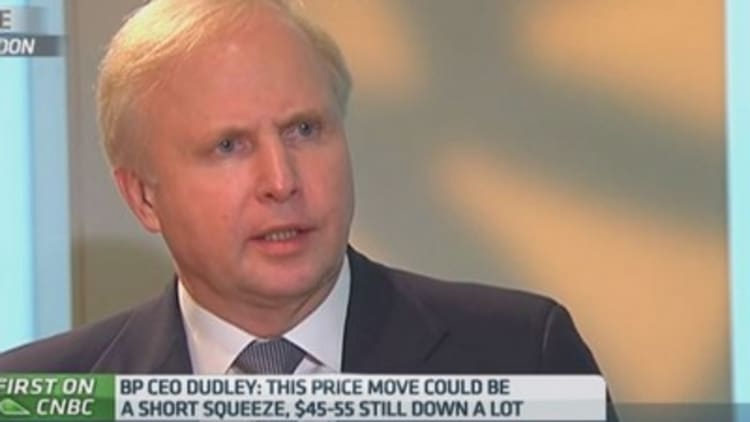
Oil prices rallied again Tuesday, with producers announcing spending cuts that added to a slew of positive factors helping to drive the commodity higher.
U.S. crude climbed more than $1.50 a barrel on Tuesday and was trading above $51 a barrel by 12:30 p.m GMT (7:30 a.m. EST). Brent crude for March delivery opened at $55 a barrel and had risen to $56.68 a barrel by the same time. Both have seen gains of around 3 percent in morning trade and have climbed around 16 percent since Friday.
It came as BP CEO Bob Dudley told CNBC on Tuesday that the number of U.S. shale rigs was "dropping like a stone," but added that it would be a while before excess supply worked its way out of the market.
"The really good parts of the shale (industry) can sustain $30, but those that are around the fringes of that, they're going to struggle. I think we'll see eventually … (the number) flatten out and then drop."
Oil has seen a few sessions of firmer prices, with the Brent crude benchmark close to erasing its total losses for the year so far.
Capital expenditure slashed
The dramatic fall in the price of oil—which tanked as much as 60 percent from mid-June—has been due to weak demand, a strong dollar and booming U.S. oil production, according to the International Energy Agency (IEA).
OPEC's reluctance to cut its output has also been seen as a key reason behind the fall.
Analysts cited a number of key drivers in the market that have both pushed and pulled the price of oil this week.
On the downside, a survey by Morgan Stanley showed a weak demand outlook in China, according to Reuters, which also reported Tuesday that Chinese offshore oil and gas producer CNOOC was aiming for a 14.6 percent increase in output this year.
On the upside: news that several major oil companies are planning to slash capital expenditure as they react to the dramatic slide in prices.
CNOOC said it was cutting spending by as much as 35 percent, while BP said Tuesday that its own expenditure would be around $20 billion this year, compared with $22.9 billion last year. Russia's Gazprom also announced Tuesday that it was slashing 2015 capex by almost $8 billion.
US to cut production?

This comes on the back of strikes at U.S. refineries, which began last weekend, and traders cashing in on their short positions for oil as the month of January drew to a close.
There has also been a continued fall in the amount of U.S. oil rigs in operation, according to oilfield services company Baker Hughes, which said Friday that 90 rigs had been deactivated over the previous week. Mark Lewis, a senior analyst at brokerage Kepler Cheuvreux, called this a "milestone moment" with the drop the largest "absolute reduction" in a single week since Baker Hughes started keeping records in 1987.
"Expectations (are) building that the U.S. could be closer to cutting production following the latest rig count and also news that the United Steelworkers union strike had entered a second day," Deutsche Bank's Jim Reid said in a morning research note on Tuesday.
Marius Paun and Jonathan Sudaria, two dealers at Capital Spreads, agreed that there was speculation that production may slowdown in the U.S. However, in a note Tuesday they added that this upside may be limited.
"Detailed analysis revealed that much of the drop came from low-yielding rigs, so the impact on output could be less significant than initially thought," they said.
Unidentified delegates from OPEC cited by Reuters , warning that prices were likely to stay depressed until the summer due to weak seasonal demand.
Meanwhile, hedge fund manager Paul Singer launched a stinging attack on OPEC member Saudi Arabia.
The country is the main swing producer in the Gulf region and is able to cut and expand production more freely than some of its neighbors. Singer claimed in his annual newsletter Monday that the price collapse had been "engineered" to put higher-cost rivals out of business.


